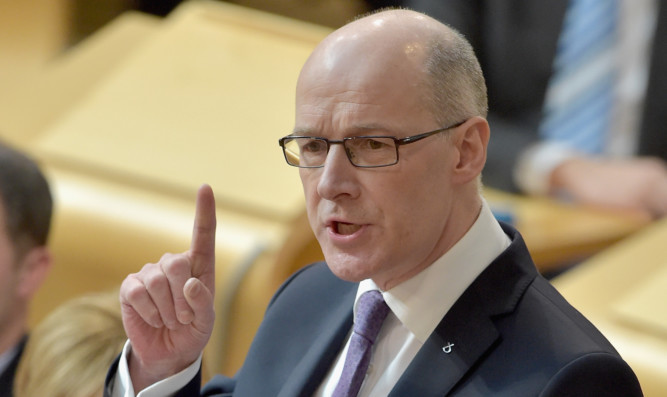Extra funding will be made available to tackle the attainment gap between rich and poor pupils in schools after the Scottish Budget was passed at Holyrood.
Finance Secretary John Swinney had announced an additional £80 million for the Scottish Government’s Attainment Scotland Fund over the next three years.
Mr Swinney said the new funding would “help ensure that every child has the opportunity to realise their potential” but came under fire for cuts to council budgets that opposition parties said would harm education.
MSPs passed the Budget by 64 votes to 57.
Hundreds of trade unionists protested outside Holyrood before the final Budget debate, arguing the local government settlement for 2016/17 represented a £350 million funding cut that will hit schools and other local services.
Councils reluctantly accepted Mr Swinney’s deal, which includes a commitment to maintain the council-tax freeze and the pupil-teacher ratio in schools and provides £250 million for integrating health and social care services.
Labour leader Kezia Dugdale branded the spending plans an “austerity budget” as she renewed calls for the Scottish Government to back her party’s proposal for a 1p tax rise.
Defending his decision to keep the Scottish rate of income tax at 10p, the same as in the rest of the UK, Mr Swinney said claims thousands of public-sector jobs would be lost as a result of his budget were “utterly exaggerated”.
He said: “It will be of limited reassurance to our pensioners or our newly-qualified teachers or our postal workers to know that people on higher salaries would be paying more in increased taxes than they will be as they see their weekly budget come under increased strain.
“They won’t care that others are paying more, they’ll care that they are paying more. That’s not a burden that I’m willing to impose.”
He told MSPs he intended to double the funds that remain to be spent through the attainment fund for schools from £80 million to £160 million over the next three years.
Additional measures in the budget include £200 million for six new NHS elective treatment centres, a new 3% charge for buyers purchasing a second home or a buy-to-let worth more than £40,000 as well as commitments to protect college funding, continue free tuition and almost double free nursery provision during the next parliament to 1,140 hours.
It also includes plans to increase spending on affordable housing by £90 million, invest £130 million in digital infrastructure and review the business rates system.
Ms Dugdale, who earlier joined the protest outside Holyrood, said: “The terrible toll of these cuts is there in black and white in the budgets being passed with heavy, heavy hearts by local councillors of all political colours.
“Our proposal is the only alternative to these cuts.”
The Liberal Democrats have also proposed a penny on income tax to “deliver £475 million worth of investment”.
Leader Willie Rennie welcomed the boost to the attainment fund but called it “window dressing in a budget that is slashing public services to the core”.
He said: “People who will lose their jobs as a result of these cuts will see no benefit from John Swinney proclaiming his protection of low-income taxpayers.”
Conservative Murdo Fraser said he welcomed the SNP joining his party in “a new taxpayers’ alliance, working hand-in-glove to protect hard-pressed working families against the tax grabbers in the Labour and Liberal Democrats”.
“I would encourage SNP members to oppose Labour’s tax grab, not on the detail, but on the principle, for in doing so, they will have the public on their side,” he said.
Green co-convener Patrick Harvie said his party was “deeply concerned” about the Budget’s “dramatic reduction in effort” on climate change, energy efficiency and fuel poverty.
He called for the continued investment in an “unsustainable transport infrastructure” to be reversed.
